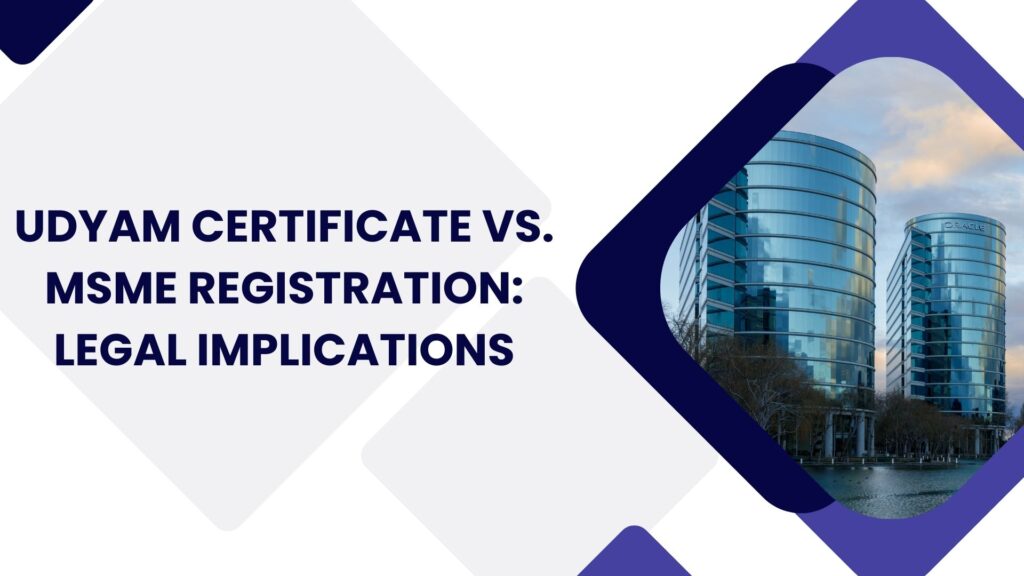Introduction
In India, the Micro, Small, and Medium Enterprises (MSME) sector plays a pivotal role in the country’s economic growth and employment generation. The government recognizes the importance of this sector and has introduced various schemes and initiatives to support it. Two significant aspects of this support are the Udyam Certificate and MSME Registration. While these two terms may seem interchangeable, they have distinct legal implications that can significantly impact businesses. In this article, we will delve into the legal nuances of Udyam Certificate and MSME Registration, highlighting their differences, significance, and implications.
Understanding MSME Registration
MSME Registration is a well-established process aimed at providing small and medium-sized businesses with various benefits and incentives. This registration is governed by the Micro, Small, and Medium Enterprises Development (MSMED) Act, 2006 vlineperol. The primary purpose of MSME Registration is to promote the growth of these enterprises by facilitating their access to credit, marketing assistance, and other government schemes.
Key benefits of MSME Registration include:
Financial Assistance:
MSMEs can avail of various financial benefits, such as lower interest rates on loans and priority in lending by banks.
Fiscal Incentives:
Tax rebates, subsidies, and exemptions are provided to registered MSMEs to reduce their financial burden.
Protection against Delayed Payments:
The MSMED Act mandates that buyers must pay MSMEs within a specified time frame, failing which they are liable to pay interest.
Access to Government Tenders:
Registered MSMEs are often given preference in government procurement, which opens up new business opportunities.
Conducive Environment for Growth:
MSME Registration offers recognition and credibility, which can boost a business’s growth prospects.
Understanding Udyam Certificate
The Udyam Registration, on the other hand, is a relatively new concept introduced in 2020, replacing the traditional MSME Registration process. It is an online registration process based on self-declaration and is regulated by the Ministry of Micro, Small and Medium Enterprises. The Udyam Certificate is essentially a digital document that provides recognition to businesses as a ‘Udyam’ or MSME.
Key features of the Udyam Certificate include:
Ease of Registration:
Udyam Registration is a simplified process that requires minimal documentation compared to the older MSME Registration diagonaux.
Online Verification:
The Udyam Certificate can be easily verified online, enhancing its credibility.
No Limit on Investment:
Unlike MSME Registration, Udyam does not have any distinction based on investment in plant and machinery, making it accessible to a wider range of businesses.
Legal Implications and Differences
Now that we have a basic understanding of both Udyam Certificate and MSME Registration, let’s explore their legal implications:
Eligibility Criteria:
While both Udyam Certificate and MSME Registration offer benefits to small and medium enterprises, Udyam is more inclusive. It does not impose any limit on investment in plant and machinery, whereas MSME Registration categorizes enterprises based on their investment in these assets.
Compliance Requirements:
Udyam Registration focuses on self-declaration and is less stringent in terms of compliance compared to MSME Registration. This simplicity can be advantageous for small businesses with limited resources to meet regulatory requirements.
Continuity:
Existing MSME Registrations continue to be valid, but businesses may choose to migrate to Udyam Registration if they prefer the simplified process. This transition can have implications for taxation, government benefits, and other legal aspects.
Taxation:
The income tax laws in India recognize both Udyam Certificate and MSME Registration. Depending on the registration type, businesses may avail of various tax benefits, such as deductions and exemptions.
Government Benefits:
The government offers numerous incentives and schemes for both Udyam and MSME-registered businesses. Understanding the specific benefits and eligibility criteria for each is crucial for maximizing government support.
Transitioning from MSME Registration to Udyam Certificate
If your business is already registered under the traditional MSME Registration, you might be contemplating a transition to the Udyam Certificate due to its simplified process. Here are some important considerations when making this transition:
Validity:
Your existing MSME Registration remains valid until its expiration. However, it’s essential to note that Udyam Registration is the government’s current focus, and new schemes and benefits may be aligned with it. So, you might consider transitioning to Udyam Registration when your MSME Registration is up for renewal.
Migration Process:
The government has provided a seamless migration process for businesses registered under the older system. You can easily migrate your MSME Registration to Udyam by providing your existing Udyog Aadhar Number (UAN) or MSME Registration Number during the Udyam Registration process. Ensure that all your business details are accurate during this transition.
Tax Implications:
Transitioning from MSME Registration to Udyam Certificate may have tax implications. Consult with a tax professional to understand how the change might affect your income tax benefits and obligations.
Government Schemes:
Different government schemes and incentives may be available to Udyam-registered businesses. Research and identify which schemes align with your business goals and explore them for added support.
Legal Compliance:
Ensure that your business complies with all legal requirements and obligations under the new registration. Keep documentation up to date and readily available for verification if required.
Stay Informed:
The business environment is dynamic, and government policies evolve. Stay informed about any changes in regulations, benefits, or compliance requirements to ensure that your business maximizes the advantages of Udyam Registration.
Suggested Read: Download Udyam Certificate
Conclusion
In conclusion, the Udyam Certificate and MSME Registration serve as essential tools for the growth and development of small and medium-sized enterprises in India. While they share a common goal of providing benefits and recognition to these businesses, their legal implications differ significantly. Businesses must carefully evaluate their specific needs, compliance capabilities, and growth aspirations before choosing between Udyam Certificate and MSME Registration. Moreover, staying informed about any updates or changes in regulations is crucial to make the most of the available opportunities and legal benefits offered by the government to promote the MSME sector.

